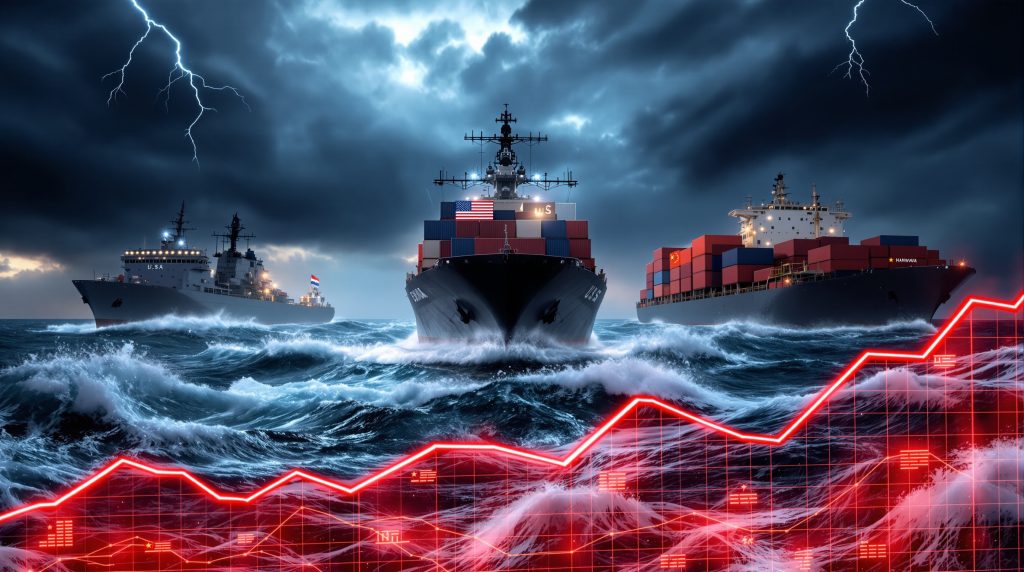The Latest Maritime Sanctions in US-China Trade Relations
China has taken decisive action against American maritime interests by sanctioning five US subsidiaries of South Korean shipbuilder Hanwha Ocean. This move represents a significant escalation in the ongoing US‑China trade war impacts with potential ripple effects across global shipping and trade networks.
The sanctions, announced on October 14, 2025, have immediately impacted market sentiment, with both WTI and Brent crude falling by more than 2% as traders assessed the implications for global trade and economic growth.
What Prompted China's Maritime Sanctions?
The Official Justification
China's Commerce Ministry has explicitly cited these companies' cooperation with US government investigations into Chinese maritime sectors as the reason for sanctions. According to the ministry's statement, Hanwha's US subsidiaries have "assisted and supported the US government's probes and measures against Chinese maritime, logistics and shipbuilding sectors," actions that Beijing considers harmful to its national interests.
The statement further emphasized China's "strong dissatisfaction and resolute opposition" to what it perceives as interference in its domestic industries, highlighting the increasingly assertive stance China is taking to protect its economic interests.
The Section 301 Investigation Connection
The sanctions appear to be a direct response to ongoing US investigations under Section 301 of the Trade Act, which specifically targets China's practices in maritime industries. This investigation framework has been a recurring point of contention in US-China trade relations since 2018, with various sectors falling under scrutiny.
Section 301 gives the US government broad authority to investigate and respond to foreign trade practices it deems unfair or discriminatory, making it a powerful but controversial tool in trade disputes.
Timeline of Escalating Maritime Tensions
- Early 2025: US initiated Section 301 investigation into Chinese maritime practices
- Mid-2025: Initial findings suggested unfair advantages for Chinese shipbuilders
- September 2025: US expanded investigation scope to include logistics companies
- October 14, 2025: China announced sanctions against Hanwha Ocean's US subsidiaries
This progression shows how rapidly tensions have escalated in the maritime sector, moving from investigation to direct economic countermeasures in less than a year.
Which Companies Are Affected by China's Maritime Sanctions?
The Five Sanctioned Subsidiaries
The sanctions specifically target five US-based entities owned by South Korea's Hanwha Ocean:
- Hanwha Shipping LLC
- Hanwha Philly Shipyard Inc.
- Hanwha Ocean USA International LLC
- Hanwha Shipping Holdings LLC
- HS USA Holdings
These sanctions effectively cut these companies off from doing business with any Chinese entities, creating immediate operational challenges.
The Strategic Significance of Hanwha Philly Shipyard
Hanwha Philly Shipyard holds particular importance in this dispute. Recently acquired by Hanwha Group for approximately $100 million, this facility has been positioned as a cornerstone of Korea-US shipbuilding collaboration. The shipyard has been associated with the informal "MASGA" initiative (Make American Shipbuilding Great Again), making it both economically and symbolically significant.
The selection of this particular shipyard for sanctions appears calculated to disrupt US efforts to revitalize its domestic shipbuilding capacity.
Immediate Business Implications
These sanctions effectively prohibit all Chinese entities and individuals from conducting business with the sanctioned companies, creating immediate operational challenges for their supply chains and customer relationships in China.
For companies with integrated global supply chains, this sudden disruption forces difficult operational decisions and potentially costly restructuring.
How Will These Sanctions Impact Global Maritime Industries?
Market Reactions and Oil Price Volatility
Oil markets reacted swiftly to the news, with both WTI and Brent crude falling more than 2% following the announcement. As of 7:21 a.m. EDT on October 14, 2025, the oil price movements in trade war showed significant volatility:
| Crude Oil Benchmark | Price | Change |
|---|---|---|
| WTI Crude | $58.12 | -2.30% |
| Brent Crude | $61.94 | -2.18% |
This market reaction reflects broader concerns about how escalating trade tensions might impact global economic growth and energy demand.
Supply Chain Disruptions
The maritime industry operates on complex international supply chains that frequently cross geopolitical boundaries. These sanctions create new complications for:
- Parts and equipment sourcing
- Vessel construction timelines
- Shipping route planning
- International maritime partnerships
Companies now face difficult decisions about restructuring their supply chains to minimize exposure to similar geopolitical risks in the future.
Potential Industry Fragmentation
These sanctions may accelerate the trend toward regional shipping networks rather than truly global ones, as companies increasingly align with either US or Chinese regulatory frameworks to minimize disruption risks.
This "decoupling" effect could lead to duplicated capacity, higher costs, and less efficient global trade networks over time.
What Does This Mean for US-China Trade Relations?
Pattern of Tit-for-Tat Retaliation
This action follows a familiar pattern in US-China trade relations, where regulatory actions by one country are met with targeted countermeasures by the other. Last week, China enhanced export controls on rare earths and processing technology, representing another front in this multifaceted trade conflict.
The timing of both measures suggests a coordinated strategy by China to signal resolve ahead of upcoming diplomatic engagements.
Strategic Industries Under Pressure
Both nations have increasingly focused their trade actions on industries with strategic significance:
- Maritime shipping and shipbuilding
- Rare earth minerals and processing
- Semiconductor manufacturing
- Advanced telecommunications
These sectors represent the technological and industrial foundations of economic power in the 21st century, making them natural focal points for economic competition.
Diplomatic Context and Upcoming Summit
The timing of these sanctions is particularly notable given the planned meeting between President Trump and Chinese President Xi Jinping at an upcoming summit in South Korea later this month. The Trump tariffs implications will likely be a central topic during these discussions as both sides seek potential paths forward.
Previous US-China summits have sometimes produced temporary trade truces, but the expanding scope of disputes makes comprehensive resolution increasingly difficult.
How Are Third Countries Being Affected?
South Korea Caught in the Middle
This case illustrates how third countries can become collateral damage in US-China trade tensions. South Korea's Hanwha Group now faces significant challenges managing its US subsidiaries that have been cut off from the Chinese market.
The situation highlights the increasingly difficult position of countries with strong economic ties to both superpowers, forcing them to navigate conflicting regulatory requirements and political pressures.
Global Trade Uncertainty
The unpredictability of escalating sanctions creates broader uncertainty for international businesses with connections to both markets, potentially leading to:
- Higher risk premiums in financing
- Increased insurance costs
- More complex compliance requirements
- Cautious investment approaches
Businesses are increasingly adopting "China+1" or "US+1" strategies to diversify their operational footprints and reduce exposure to bilateral tensions.
Potential for New Alliances
As tensions continue, countries and companies may be forced to make more definitive choices about their primary trade relationships, potentially reshaping global economic alliances.
Regional trade agreements may gain importance as alternatives to the increasingly fragmented global trading system.
What Are the Economic Implications of Continued Trade Tensions?
Oil Market Outlook
The combination of trade tensions and existing supply concerns creates a complex outlook for oil markets:
- Potential demand reduction from economic slowdown
- Expected record supply glut in coming months
- Geopolitical risk premium in certain regions
- Volatility likely to persist through year-end
Ole Hansen, Head of Commodity Strategy at Saxo Bank, noted that "Crude oil is falling as risk appetite fades once again, led by renewed selling across U.S. equities amid persistent concerns over the trade war's impact on corporate results." He further indicated that unless there's "an escalation involving Russia," prices could slide toward "key support levels, in Brent below $60."
Global Growth Concerns
Market analysts have expressed growing concern about how prolonged trade tensions might impact global economic performance. The global markets recession outlook has darkened as the cumulative effect of multiple trade barriers creates friction throughout the global economy, potentially reducing efficiency and slowing growth.
The International Monetary Fund has previously estimated that sustained trade tensions could reduce global GDP by up to 0.8%, with effects concentrated in countries deeply integrated into global supply chains.
Industry-Specific Impacts
Beyond immediate market reactions, continued tensions could lead to:
- Delayed investment in new shipping capacity
- Reshoring of certain maritime manufacturing
- Higher costs for international shipping
- Acceleration of alternative supply chain development
Maritime insurance costs are likely to rise in response to increased regulatory risks, further adding to the cost of global trade.
What Could Resolve These Maritime Trade Tensions?
Potential Diplomatic Pathways
Several possible developments could help de-escalate the current situation:
- Successful negotiations at the upcoming Trump-Xi summit
- Mutual suspension of recent trade actions as a confidence-building measure
- Sector-specific agreements on maritime industries
- WTO-facilitated discussions on shipping regulations
Previous trade disputes have sometimes been resolved through targeted agreements that address specific concerns while allowing both sides to claim victory.
Industry Adaptation Strategies
Companies caught in these trade crosscurrents are developing various approaches:
- Creating separate corporate entities for US and China operations
- Diversifying supply chains across multiple countries
- Developing contingency plans for various sanction scenarios
- Engaging in more proactive government relations
Risk mitigation strategies now include regular simulation of geopolitical disruption scenarios as part of standard business planning.
Long-Term Structural Solutions
More fundamental solutions might include:
- New international frameworks for maritime trade disputes
- Clear rules on government support for shipbuilding industries
- Transparent standards for port access and shipping regulations
- Multilateral approaches to addressing trade grievances
Without such structural reforms, the risk of recurring tensions in strategic sectors remains high.
What Should Investors and Industry Participants Watch For?
Key Indicators of Escalation or De-escalation
Those monitoring this situation should watch for:
- Additional sanctions announcements from either side
- Statements from maritime industry associations
- Changes in shipping rates on Asia-US routes
- Outcomes from the upcoming Trump-Xi meeting
- Shifts in shipbuilding orders and construction timelines
The Baltic Dry Index and container freight rates serve as useful barometers for the actual impact on shipping markets.
Potential Market Opportunities
Despite challenges, some areas may present opportunities:
- Regional shipping specialists less exposed to cross-border tensions
- Alternative shipping hubs in Southeast Asia
- Maritime technology solutions that enhance efficiency
- Shipyards in neutral countries gaining market share
Companies with flexible, adaptable business models may be best positioned to navigate the changing landscape.
Risk Management Considerations
Companies in the maritime sector should consider:
- Reviewing contract terms for force majeure provisions
- Assessing supply chain vulnerabilities
- Developing geographic diversification strategies
- Monitoring compliance requirements in both markets
Legal experts recommend comprehensive sanction compliance programs with regular updates to reflect rapidly changing regulatory environments, according to a recent Reuters report on the escalating maritime tensions.
FAQs About China's Maritime Sanctions
How do these sanctions differ from previous trade actions?
These sanctions specifically target the maritime industry and uniquely involve subsidiaries of a third country (South Korea), representing an evolution in China's approach to trade retaliation. Unlike previous measures focused on tariffs, these sanctions directly prohibit business relationships, making them potentially more disruptive to established operations.
Will these sanctions affect consumer goods prices?
While not immediately, prolonged shipping and maritime manufacturing disruptions could eventually contribute to higher transportation costs for consumer goods. The maritime industry underpins approximately 90% of global trade, so disruptions can eventually filter through to consumer prices if alternative shipping arrangements increase costs.
Are other shipbuilders likely to face similar sanctions?
Companies with similar profiles—particularly those supporting US maritime investigations—may face heightened risk of similar actions. Any shipbuilder with significant US government contracts or involvement in strategic maritime projects could be vulnerable to future measures, as Bloomberg has reported in their analysis of the shipping industry fallout.
How might this affect global shipping rates?
If these tensions lead to reduced capacity or efficiency in global shipping, rates could increase, particularly on routes connecting Asia and North America. The tariffs impact on markets often extends beyond the directly targeted industries to affect broader shipping and logistics costs.
What industries beyond shipping might be affected?
Any industry reliant on efficient global shipping could feel secondary effects, including electronics, automotive, and consumer goods manufacturing. Just-in-time manufacturing systems are particularly vulnerable to shipping delays and uncertainty, potentially forcing companies to increase inventory holdings at higher cost.
Ready to Be Alerted About Market-Moving Trade Developments?
Stay ahead of market-disrupting events like these US-China trade tensions with Discovery Alert's proprietary Discovery IQ model, which delivers real-time notifications on significant ASX announcements that could impact your investments. Visit our discoveries page to see how timely information translates into exceptional investment opportunities.




